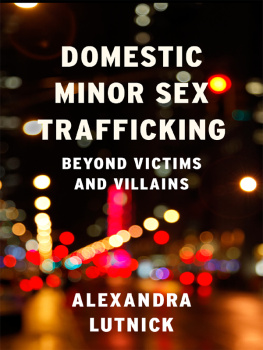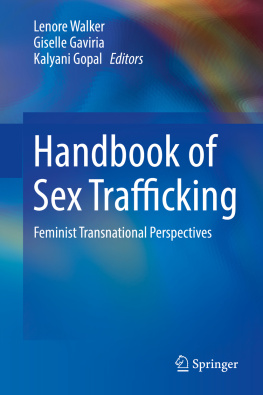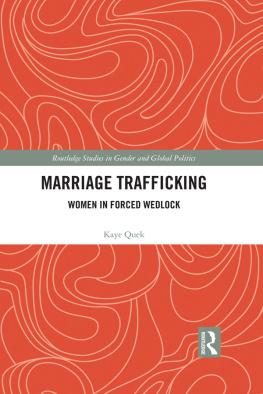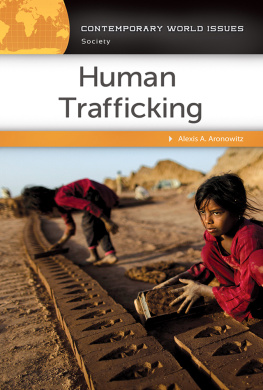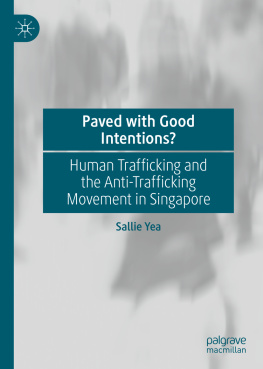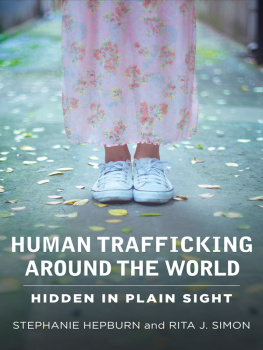DOMESTIC MINOR SEX TRAFFICKING
DOMESTIC MINOR SEX TRAFFICKING
BEYOND VICTIMS AND VILLAINS
ALEXANDRA LUTNICK
COLUMBIA UNIVERSITY PRESS NEW YORK
Columbia University Press
Publishers Since 1893
New York Chichester, West Sussex
cup.columbia.edu
Copyright 2016 Columbia University Press
All rights reserved
E-ISBN 978-0-231-54083-4
Library of Congress Cataloging-in-Publication Data
Lutnick, Alexandrea
Domestic minor sex trafficking : beyond victims and villains / Alexandra Lutnick
pages cm
Includes bibliographical references and index.
ISBN 978-0-231-16920-2 (cloth : alk. paper) ISBN 978-0-231-16921-9 (pbk. : alk. paper) ISBN 978-0-231-54083-4 (ebook)
1. Teenage prostitutionUnited States. 2. Human traffickingUnited States.
3. ProstitutesServices forUnited States. 4. Social work with prostitutesUnited States I. Title
HQ144.L96 2015
306.740835
2015014570
A Columbia University Press E-book.
CUP would be pleased to hear about your reading experience with this e-book at .
COVER DESIGN: Lisa Hamm
References to Internet Web sites (URLs) were accurate at the time of writing. Neither the author nor Columbia University Press is responsible for URLs that may have expired or changed since the manuscript was prepared.
For my parents, Carole and Carl Lutnick
CONTENTS
FIGURES
TABLES
I want to express my deep gratitude to all the people who have been integral to the completion of this book. Looking back over fifteen years, I am eternally grateful for the time I spent working at the St. James Infirmary, a peer-based occupational health and safety clinic for sex workers. How I think about the issue of young people who trade sex is directly informed by my time there as well as by my experiences working on studies with young people and adults who trade sex and working in a homeless family shelter. Being a part of the recent research team at RTI International that conducted a process evaluation of three programs funded by the U.S. Department of Justice to work with young people who trade sex was crucial to this book. My conversations with case managers and program staff at the Standing Against Global Exploitation (SAGE) Project in San Francisco, the STOP-IT Program of the Salvation Army in Chicago, and the Streetwork Project at Safe Horizon in New York City about the young people they work with and their experiences doing this work formed the foundation of this book. I thank all the staff, volunteers, clients, and research participants I have had the pleasure of interacting with. I hope that in this book I have represented the complexities of this issue that they have shared with me over the years.
My research for this book started out in the School of Social Welfare at the University of CaliforniaBerkeley. I can think of no other academic program that attracts such supportive individuals. Jennifer Lawson, Bryn King, Heliana Ramirez, Kelly Whitaker, Christina Branom, Wendy Wiegman, Leah Jacobs, Sarah Accomazzo, and Eve Ekman made what could have been a very stressful experience one of mutual support and learning. I especially thank Jae Sevelius, Julianna Deardorff, Jill Duerr Berrick, and in particular Eileen Gambrill. Working with Eileen has been one of the highlights of my experiences in the School of Social Welfare, and I am indebted to her for all the support and inspiration she provided. I also thank Samantha Majic for encouraging me to apply to a Ph.D. program. None of this would have happened if she had not given me the firm yet friendly nudge to just get over myself and take the GRE.
I have also been fortunate to work with an amazing group of people at RTI International. The opportunity to work with, learn from, and be supported by Alex Kral, Jennifer Lorvick, Megan Comfort, Lynn Wenger, Cindy Changar, Andrea Lopez, Christina Powers, Alexis Martinez, and Michle Thorsen has been a gift. I was fortunate to be tapped by Deborah Gibbs to join her on the process-evaluation team. Without being part of that study, I would not have written this book. I thank Deborah Gibbs, Shari Miller, Jennifer Hardison Walters, and Marianne Kluckman for ongoing discussions about this topic and for graciously letting me carve out a piece of our study for this book.
Sometimes in life we are in the right place at the right time. I am deeply appreciative that Jennifer Perillo, the editor for social work, psychology, and criminology at Columbia University Press, happened to attend a presentation I gave at the Society for Social Work and Research Annual Conference. It was because of that chance meeting that the process of getting this book published began. Jenn has been encouraging from the beginning, and her enthusiasm for making this book happen has been humbling. I am also grateful to the anonymous peer reviewers who reviewed my proposal and final manuscript. I benefitted tremendously from their comments, insights, and critiques. Special thanks to Stephen Wesley for his help getting the manuscript ready for production and to Annie Barva for her editing of the final draft.
I consider myself very fortunate to be part of a community of people who identify as sex workers, survivors, scholars, activists, academics, service providers, or some combination of these various identities. In addition to the people I already mentioned, I also want to acknowledge the importance of Minh Dang, Carol Leigh, Stephany Ashley, Cyd Nova, Johannah Westmacott, Kelli Dorsey, Paniz Bagheri, Emi Koyama, Minouche Kandel, Naomi Akers, Chuck Cloniger, Deborah Cohan, and Sienna Baskin. These people and many others not included in this incomprehensive list have taught me so much, linked me to key resources, shared perspectives with me about this issue, and offered support and encouragement along the way.
Finally, I am very grateful for the support provided by my family, friends, and former teachersmy brother, Jack, and grandmother, Beverly; friends such as Holly Clark, Glen Dentinger, Kay Clark, Lynn Rosenthal, Bill Simpson, Nadia Oka, and Alan Scherer; my high school teachers Steve Worful and Greg Hemesath and my undergraduate teachers James Leo Walsh and William Edwards. In their own unique ways, each helped me write this book. Throughout this entire process, I have been blessed to have Joseph Carouba by my side. Moving through the world with Joe is one of the greatest gifts of my life. Although both of my parents have passed, I know that without their love and support, I would not be where I am today. Not a day goes by that I dont think about them and reflect on how lucky I am to be the daughter of Carole and Carl Lutnick.
America is in the grip of a highly profitable, highly organized and highly sophisticated sex trafficking business that operates in towns large and small, raking in upwards of $9.5 billion a year in the U.S. alone by abducting and selling young girls for sex.
J. W. WHITEHEAD, AMERICAS DIRTY LITTLE SECRET
I n 2000, the United States Congress authorized the Victims of Trafficking and Violence Protection Act, more commonly referred to as the Trafficking Victims Protection Act (TVPA). Section 103.8 defines any U.S. citizen or lawful permanent resident younger than eighteen who is involved in commercial sex acts as a victim of a severe form of trafficking in persons. An increase in public awareness of and services for domestic minor victims of sex trafficking increased followed the passage of the TVPA.
Over the past one hundred years in the United States, this issue has been referred to as

